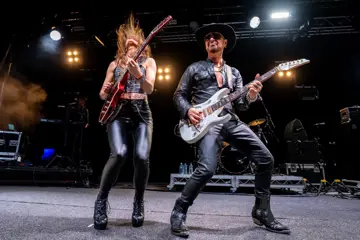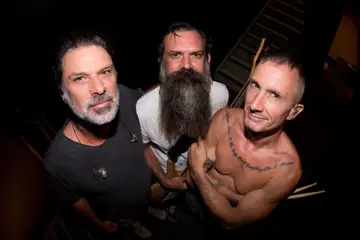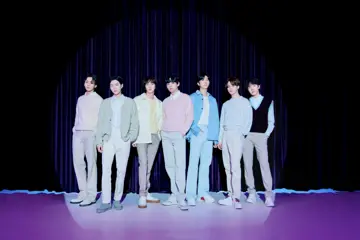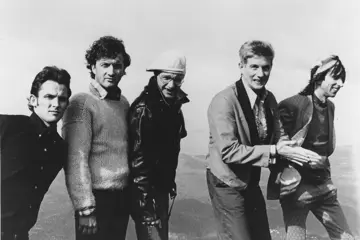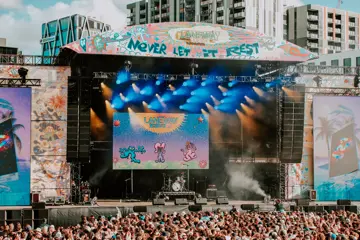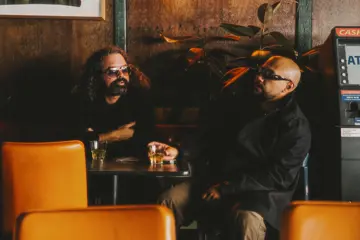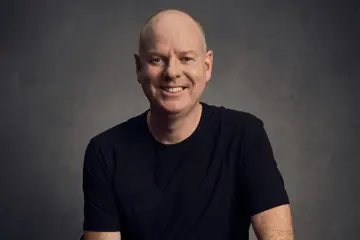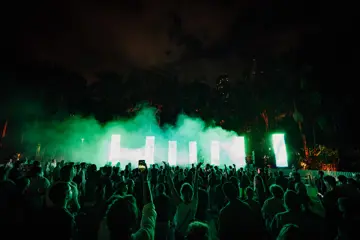The Human Rights Arts & Film Festival is an annual highlight of the local cinematic calendar. Brilliantly programmed, it delivers a selection of films balancing social weight with artistic merit. The 2016 edition just opened in Melbourne, and will roll out Australia-wide in the coming weeks.
CHASING ASYLUM

The festival’s opening night film matches celebratory champagne with an unblinking look at our great national shame. Eva Orner’s documentary is a thorough study of the detention centres in which we send incoming refugees; Australia the only country in the world willing to put children in indefinite detention.
Featuring footage covertly shot —by volunteers, security guards, and detainees— on phones, it’s an on-the-ground, behind-the-curtain look at life on Nauru and Manus, a horrifying portrait of institutionalised inhumanity, in which the already displaced and desperate are forced to dwell in a sustained purgatory.
THE ARMOR OF LIGHT

Exploration of the links between Evangelical Christianity and the NRA in the American right-wing —the "Faustian pact" between politics and the church—told through an Evangelical minister who, in the face of the American gun-death crisis, dares to take on a culture of gun worship amongst the theoretically Godly.
THE BAD KIDS

Classic fly-on-the-wall observationist doc —from Keith Fulton and Louis Pepe, last seen making the Siamese-twin rock-exploitation mockumentary Brothers Of The Head a decade ago— chronicles a year at a ‘continuation’ school in the California desert, where one-time drop-outs work to earn the credits to graduate high-school.
The kids are, more often than not, coming from hard backgrounds, and have little adult support or supervision; some find individual strength from having their fate in their hands, others fall victim to cycles of abuse, drug-abuse, and self-destruction.
BURDEN OF PEACE

"I think it is a film that is happy," says Claudia Paz y Paz; it hard for her to think of a film about her life —which continues after the closing credits— as being unhappy. But, Burden Of Peace is a deeply sad film. It chronicles Paz y Paz’s time as Guatemala’s first female Attorney-General.
Like the Obama presidency, her term begins with rays of hope and change: Paz y Paz out to prosecute the military members responsible for past genocides, including former dictator Efraín Ríos Montt. But, then, along come the old, rich men in suits; the elites who profited from past regimes seeing a challenge to the status quo as something that needs to be quashed. No prizes for guessing what happens next; Burden Of Peace climaxing with an end that’s anything but "happy".
CENSORED VOICES

Mor Loushy’s documentary is built around testimonies of Israeli soldiers speaking in the wake of the Six Day War, recorded audio that kept sealed for half a century. There’s evident profundity in the film’s set-up, where these now-old men —including Amos Oz, no less— are invited to listen to themselves on tape; hearing them decrying how, less than a generation removed from World War II, they were complicit in carrying out another holocaust.
But the movie gains even more depth by presenting old newsreels —be they works of propaganda, Pollyanna sentiment, or prescient political musings— removed from their original context; this no longer a story about the heroic founding of a nation, but the spectre of the violence employed to do so.
DREAMING OF DENMARK

Michael Graversen’s incredibly intimate documentary is a portrait of an Afghan teenager seeking asylum in Denmark. Once he turns 18, he’s officially denied an application, and flees into Europe, illegally crossing borders and living life on the lam. The film’s most bracing, shocking scenes come with the rapid deterioration of its subject; who, spending a stint living homeless in an Italian winter, becomes a ghost of his former self, barely recognising the documentarian who’s spent years following him.
DRIVING WITH SELVI

A sweet ‘character study’ of a single subject, this documentary follows a South Indian girl who —sent into an arranged marriage at 14, a month after her first period— after fleeing her indentured her union, commits herself to becomingthe district’s first female taxi driver, and then, an independent woman standing in defiance of a culture that demands her compliance.
DRONE

Smart study of the new frontiers of war, looking at the phenomenon of drones through a long-view lens, via a wide array of subjects. There’s political strategists and human-rights lawyers, the American pilots tasked with killing people in far-away foreign countries, the engineers who build these weapons of terror, and those in Waziristan who live under a steady rain of drone strikes.
Director Tonje Hessen Schei offers no easy answers, instead posing difficult questions; though it’s hard to see the astounding outbreak of drones in our skies —God-like vessels watching down upon the Earth, smiting those they see fit— as anything other than terrifying.
GTFO

Largely made even before Gamergate brought the shocking culture of online/video-game misogyny to mass-media light, this simple, accessible documentary explores the realm of women-in-games, from programmers to players, showing how they’re systematically victimised by an industry built on male power fantasies.
HOOLIGAN SPARROW

A look at the activism —and reciprocal persecution— of Chinese women’s-rights campaigner Ye ‘Sparrow’ Haiyan, who became famous for her meme-able agitation for sex-workers rights. Nanfu Wang’s personal, first-person-centric documentary is one of those films whose existence is, itself, an act of defiance; her covertly-shot footage chronicling China’s entrenched political patriarchy, and the governmental blowback against any perceived act of sedition.
LAND GRABBING

Kurt Langbein’s thoughtful, thorough, meticulous pic comes from a long tradition of Austrian documentaries —like Our Daily Bread, Workingman’s Death, and Darwin’s Nightmare— looking at the effects of globalisation and industrialised agriculture.
Here, we visit on-the-ground lands —in Cambodia, Romania, Ethiophia, and Indonesia— in which local peasants are forcibly evicted, then employed for a pittance in industrialised agri-business monstrosities owned, largely, by European conglomerates. Land Grabbing explores the marketing phrase ‘paddock to plate’ on its mass-industrial level; going from Ethiopian pickers frisked to make sure they’ve taken no vegetables, to the Dubai luxury-hotel chefs employing them in haute-cuisine dishes, where kitchen-prep food-porn images are shown with due irony.
MALLORY

Singular study of one subject over 13 years, in which Helena Třeštíková solemnly observes the trials and tribulations of an often-homeless Czech mother; it, ultimately, a study in how a society treats those who’ve fallen through its cracks.
MAYA ANGELOU: AND STILL I RISE

At first, you wonder why this essentially anodyne, talking-heads-filled bio-doc of a celebrity figure is in the HRAFF program, but, then, as Angelou’s life unfolds, it becomes indivisible from so much 20th-century history; from a Klan-persecuted childhood in segregated Arkansas, through to her connections to the civil rights struggle and African independence movement. It’s slight cinematic stuff given a dreary ‘inspirational’ air, but you still can’t mistake the activist spirit that persists throughout.
THE MEASURE OF A MAN

HRAFF is always big on documentaries, with relatively few fiction features. But Stéphane Brizé’s sterling drama is one of the festival’s true highlights; coming steeped into the social-realist milieu of the Dardennes. It stars Vincent Lindon as a laid-off factory-worker who, desperate for work, gets a surveillance/security position at a supermarket; where he polices not only shoplifters, but his fellow employees. Going deep into the world of usually anonymous service-industry workers, Brizé sees humanity in his every character; his film filled with moral conflicts and complexities.
ORIENTED

Documentary portrait of three queer Palestinian pals dealing with sexual identity and social issues in contemporary Tel Aviv. There’s nights out, coming-outs, break-ups, weddings, laughs, tears; but its greatest resonance comes in the discussions —and the internal wrangling— of whether to attempt to enact social change in the face of hostile Zionism, or whether to get out and go live somewhere more welcoming and inclusive.
OUT TO WIN

‘Gay Athlete’ documentary that holds no alarms and no surprises, this a made-for-TV talking-heads reel featuring all the familiar subjects —Billie Jean King, Martina Navratilova, Brittney Griner, Jason Collins, Michael Sam, etc— discussed in cheery tones.
THE PEARL BUTTON

Patricio Guzmán has spent a whole career chronicling Chilean political history in films at once bracing and artful. The Pearl Button is a sister picture to 2010’s great Nostalgia For The Light, making connections between the natural world and socio-political themes; this time, his thoughts revolving around the original indigenous inhabitants of the Tierra del Fuego; once again seeing Chilean soil sown in suffering. In Melbourne, the film will screen with a live-score from Dirty Three’s Mick Turner.
PRISON SONGS

Kelrich Martin’s ‘musical documentary’ is a study of the largely Aboriginal population in the NT’s infamous Berrimah Prison, in subjects express their experiences not only via to-camera testimony, but through song.
THE STANFORD PRISON EXPERIMENT

Kyle Patrick Alvarez assembles a bonkers cast —Billy Crudup, Olivia Thirlby, Tye Sheridan, Jack Kilmer, Ezra Miller, Michael ‘Bertie Chickering’ Angarano, James ‘Bob Benson’ Wolk, Thomas ‘kid from Me & Earl & The Dying Girl’ Mann, James ‘kid from Animal Kingdom’ Frecheville— to make the narrative-feature version of one of history’s most infamous psychological experiments. Fabulously acted and duly tense, it’s, as ever, a fascinating study into power relationships and attendant abusive acts, shining a light on the darkest impulses of the male psyche.
THEY WILL HAVE TO KILL US FIRST: MALIAN MUSIC IN EXILE

It’s weird to call a Human Rights documentary ‘cracking’, but Johanna Schwartz’s portrait of the Malian musicians silenced by Islamic extremists doesn’t just summon a sense of rock’n’roll rebellion, but a belief that artistic expression is a basic human right. It stars the breakout desert-rockers Songhoy Blues, who recently toured Australia, and features a host of righteous jams standing in righteous defiance of oppressors.
THE TRUE COST

Andrew Morgan’s documentary is a look at the rise of Fast Fashion, at all the planetary effects that trail out from every $10 bargain. In a showstopping, ironic climactic montage, Morgan essentially condenses the film into one power-ballad’s worth of stark juxtapositions: Black Friday shopping orgies, YouTube consumer-girl videos, H&M TV spots, and gamine catwalk struts set against images of harrowed Bangladeshi factory workers, Indian leather-tanners with horrifying skin conditions, and toxic effluent running into third-worldAnchor rivers.
A WALNUT TREE

A sterling documentary look at the displaced Afghans living in a refugee camp in frequently-bombed, war-torn Waziristan, Ammar Aziz’s sterling documentary solemnly looks on at humans reduced to animals; ambling about in a stateless nothingness that doesn’t, quite, seem like living.

